| 18 May |
• yesterday • tomorrow |
| Optional Memorial of Saint John I, Pope and Martyr |
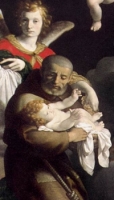
• Ass of the Capuchins (his own nickname for himself)
• Brother Deo Gratias ("Deo Gratias" was his habitual greeting)
• Felix of Catalicio
• Felix of Cantalica
• Felice Porri
Born to pious peasants, he was a shepherd in his youth. At age nine he was hired out as a shepherd and farm hand at Cotta Ducale; he worked there over twenty years. A pious youth and man, Felix spent his free time in prayer.
Having little education, Felix had a friend read him the lives of the early Desert Fathers; they left him torn - he wanted to live as a hermit, but feared he would give in to temptation if he had no superior. He sought entrance to the Capuchins; they were hesistant, but finally accepted him as a lay brother in 1543 at Anticoli, Italy near Rome. Sent to Rome in 1547 as questor for the community; he stayed there the rest of his life.
Felix's reputation for holiness spread quickly. He could not even read, yet theologians consulted him on spiritualality and Scripture. Sinners on the street would hide from him when it became obvious he could see their sins, and knew their hearts. Felix preached in the street, rebuked corrupt politicians and officials, and exhorted young men to stop leading dissolute lives. Once during Carnival, a time of open vice in the streets, Felix and Saint Philip Neri organized a procession of Capuchin friars right into the middle of the revellers; Fra Lupo, a well-known Capuchin preacher, spoke to the crowds, and Carnival ended for the year.
Felix worked with the children of Rome; his inherent simplicity and lack of education made him rather childlike, and children trusted him. He composed simple teaching canticles, and had the children gather in groups to sing them as a way to teach them catechism. The canticles became well-known and popular, and while Felix was begging for his house, Roman citizens would invite him in to sing for them; he saw these invitations as opportunities to teach, and always jumped at them.
During the famine of 1580, the city fathers asked the Capuchins for the loan of Felix as a fund raiser; he was tireless in the work. His friend, Saint Philip Neri, considered Felix the greatest saint then living. Saint Charles Borromeo sought Saint Philip's help to draw up the constitutions of the Oblates of Saint Ambrose; Philip referred him to Felix as a the best advisor.
Felix slept little, ate what came to hand, attended Mass every morning. He had a great devotion to Our Lady, frequently prayed the rosary, and was sometimes swept away in ecstacy, unable to finish the prayers. Received a vision of the Virgin Mary during which he was allowed to hold the Christ Child in his arms. Acclaimed a saint by the people of Rome immediately after his death.
18 May 1515 at Cantalice, Abruzzi, Italy
• 18 May 1587 at Rome, Italy of natural causes
• so many came to his funeral that some were injured in the press to get into the church, and an extra door had to be knocked through one wall so they could exit
• buried under an altar in the church of the Immaculate Conception in Rome
• miracles reported at his tomb
22 May 1712 by Pope Clement XI
• Cantalice, Italy
• Spello, Italy
• Capuchin holding the Infant Jesus in his arms
• with Saint Philip Neri and Saint Charles Borromeo
• Capuchin carrying a beggar's wallet
https://catholicsaints.info/saint-felix-of-cantalice/
• Monday after Ascension Day (Beinwil, Switzerland)
• 20 August (pilgrimage date)
Educated at the Benedictine monastery near his home village. Had some connection to the Kappel monastery as he is mentioned in their records. Parish priest in Beinwil, Switzerland. Known as a miracle worker, but primarily for his decades of concern for the physical and spiritual well-being of his parishioners.
Legend says that Burchard raised a wild bird from a chick (an owl, crow or jackdaw; records vary), and taught it not only to speak, but to hold conversations with him. When his household fell into evil and dissolute ways while Burchard was gone, the bird told the priest what it had witnessed. The servants killed the bird and threw the carcass into a mine shaft near the vicarage. The dead bird returned to him and managed to explain what had happened and who had done it.
Burchard once travelled to the nearby village to Unterhorben to minister to a dying woman. He was met on the road by a messenger who told him that the woman had died and he need not continue. Father Burchard went on to the house, prayed over the woman, and she came back to life long enough to receive the final sacraments and blessings.
early 12th century in Langemat, Muri, Switzerland
• c.1192 in Beinwil, Switzerland of natural causes
• buried in his parish church graveyard
• tomb opened and relics moved during the construction of a chapel on his grave site in 1619
• tomb opened and relics moved during renovation in 1754
• relics returned to the tomb in 1784
• a spring-fed holy well is found near his tomb
• beginning immediately after his death locals visited his grave to ask for intercession
• by 1228 there was a lamp burning perpetually at his grave
• by 1407 there are records of pilgrimages to his tomb
• by 1587 there are statements by witnesses to miracles obtained through the intercession of Father Burchard
• a confraternity dedicated to Blessed Burchard, Saint Peter and Saint Paul was founded in 1588
• titular patron of his parish church in 1813
• Sacred Congregation of Rites granted the celebration of a Mass and Office in his honour in 1817
• feast added to the Proper of the diocese of Basel, Switzerland in 1866
Beinwil, Switzerland
priest with an owl, crow, jackdaw or blackbird, which sometimes has a broken wing
https://catholicsaints.info/blessed-burchard-of-beinwil/
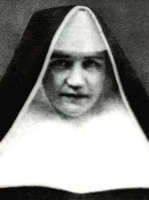
• Maria Magdalena Merten
• Blandine of the Sacred Heart
• Blandina del Sacro Cuore
After graduating from the Marienau Institute of Teaching, Maria taught in several Catholic elementary schools in the Trier, Germany region. She was known for her special care to the children of the poor, helping them however she could, and ensuring their active lives in the parish. Feeling a call to religious life, Maria joined the Ursulines of Calvarienberg-Ahrweiler, taking the name Blandine of the Sacred Heart and making her perpetual vows on 4 November 1913. As the Ursulines are a teaching order, Sister Blandine returned to teaching and added religious education, and served as a catechist. Assigned to Saarbrücken, Germany in 1916, she soon developed incurable tuberculosis. She was transferred to Trier for treatment and a better climate, continued to teach when she was strong enough, and effectively lived her last two years in the house infirmary where she spent her time in prayer.
10 July 1883 in Düppennweiler, Saar, Germany
• 18 May 1918 in Trier, Germany of tuberculosis
• buried at the Basilica of Saint Paulinus in Trier
• 1 November 1987 by Pope John Paul II
• beatification celebrated in Saint Peter's Square, Rome, Italy
• the beatification miracle involved the cure of Sister Irimberta Puntigam, SSpS, of a malignant sarcoma in 1969
Jesus and I are so close. – Blessed Blandine discussing her suffering not long before she died
For me everything is heaven. I want to live on earth as if there were only God and me. I want to love God more than anyone else has ever loved him. – Blessed Blandine
https://catholicsaints.info/blessed-blandina-merten/
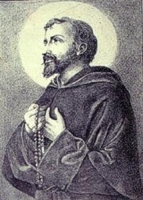
Born to the French nobility. Joined the Augustinians in Toulouse, France at age 19. Studied there and in Paris, France. Prior of the Augustinian house of Pamiers, France. Spiritual director, exorcist and, most importantly, a noted, popular preacher in Toulouse whose sermons brought many to religious life. Promoted devotion to the Blessed Virgin Mary under the title Sorrowful Mother, and for praying for souls in Purgatory. Known for his simple life, deeply spiritual preaching and writer, and his deep prayer life; none of his sermons have survived, and his only writing we have is Vision of the Punishments in Purgatory and Hell.
c.1297 in Toulouse, France
• 18 May 1369 in Toulouse, France of natural causes
• buried in the cemetery of the Saint Etienne monastery in Toulouse
• so many miracles reported at his grave that he was re-interred in the monastery church
• 1893 by Pope Leo XIII (cultus confirmation)
• the only French Augustinian friar declared Blessed by the Church so far
https://catholicsaints.info/blessed-william-of-toulouse/
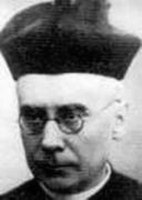
12 June as one of the 108 Martyrs of World War II
Priest in the archdiocese of Gniezno, Poland, serving in the parish of the Blessed Virgin Mary in Inowroclaw, Poland. Known for his pastoral work, especially with the poor and the unemployed. He was arrested by the invading Nazi forces on 2 September 1939, the 2nd day of the war against Poland. He was sent to forced labour in Buchenwald concentration camp, then to the Dachau concentration camp. When he was no longer able to work, he was thrown into the gas chambers. Martyr.
13 August 1876 in Ksiaz, Wielkopolskie, Poland
18 May 1942 in the gas chambers of Dachau, Oberbayern, Germany
13 June 1999 by Pope John Paul II
He endured all sufferings and torments with angelic patience, and in prayer he sought consolation and comfort; he encouraged others with a good word. – Father Dezydery Wróblewski speaking about Blessed Stanislaw
https://catholicsaints.info/blessed-stanislaw-kubski/
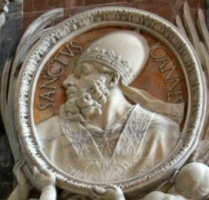
Priest in Rome. Elected 53rd pope in 523. Italy's ruler, Theodoric the Goth, was an Arian, and for a while he let Catholics alone, but in later life he became suspicious of everyone, imagining conspiracies and attempts to seize his throne. He tried to involve Pope John in his political machinations. John led a delegation to Constantinople to negotiate with Emperor Justin I; he was the first pope to travel to Constantinople, and while there crowned Justin. The mission was successful, but Theodoric thought John and Justin I had plotted against him. While returning to Rome, John was kidnapped and imprisoned by Theodoric's soldiers; he died in custody.
in Populonia, Tuscany, Italy
13 August 523
18 May 526 of thirst and starvation in prison in Ravenna, Italy
https://catholicsaints.info/pope-saint-john-i/

Venanzio, Wigand
Teenager tortured extensively and martyred with ten other Christians during the persecutions of Decius.
c.235
• beheaded c.250 at Camerino, Italy
• relics at Camerino
Camerino, Italy
• young man crucified upside-down with smoke coming from his head
• young man holding the citadel of Camerino, Italy
• young man holding the city of Camerino, a palm, and a book
• young man with a banner holding a city wall
https://catholicsaints.info/saint-venantius-of-camerino/
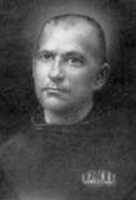
• Marcin Oprzadek
• Martin Oprzadek
12 June as one of the 108 Martyrs of World War II
Joined the Franciscan Friars Minor in the province of Saint Mary of the Angels in 1912. Drafted into military service in World War I, he returned to the monastery after the war and made his solemn profession on 4 October 1924, taking the name Marcin. Priest. Arrested on 26 August 1940 with several other friars during the Nazi persecutions. Deported to the Sachsenhausen concentration camp, then to Hartheim where he was executed. Martyr.
4 March 1884 in Koscielec, diocese of Krakow, Poland
18 May 1942 in the gas chambers of Hartheim, Austria
13 June 1999 by Pope John Paul II
https://catholicsaints.info/blessed-jan-oprzadek/
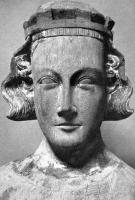
• Henry of Sweden
• Eric The Lawgiver
• Eric IX
• Erico IX, King of Sweden
King of Sweden. Defended his country from Finnish invasions. Codified Swedish law under Gospel principles. Used his throne to spread the Gospel through his kingdom. Built the first large church in Sweden at Old Uppsala. Murdered by conspiratorial, anti-Christian Swedish nobles; martyr. Never formally canonized, his cultus developed almost immediately upon his death. Due to his zeal in the defense of his country and his faith, his banner has been carried by Swedes, including non-Catholics, for centuries.
beheaded on 18 May 1161 as he left Mass
• farmers
• Sweden
https://catholicsaints.info/saint-eric-of-sweden/
• Potamon of Alexandria
• Potamone....
Bishop of Heraclea, Egypt. Tortured, mutilated and crippled for his faith during the persecutions of Maximinus Daia in the early 4th century. Attended the Council of Nice in 325 and zealously opposed Arianism. Friend of Saint Athanasius whom he defended in the Council of Tyre in 335. When the Arian Gregory grabbed power in Egypt in 341, he had Potamon beaten with clubs and left for dead; Potamon received medical help, survived his inujuries for a while, but eventually died from the damage. Martyr. Athanasius wrote about his life and referred to Potamon as a "double martyr" because of the abuse he suffered in two separate persecutions.
in 341 in Alexandria, Egypt from injuries sustained from a beating with clubs
https://catholicsaints.info/saint-potamon-of-heraclea/
Aelfgifu, Aelgifu, Aelgytha, Algyva, Elfgiva
Queen; wife of King Edmund I. Mother of King Edwy of Saxony, and Saint Edgar the Peaceful. Widowed young. Known all her life for her personal piety and support of the Church, endowing several churches and monasteries Later in life she retired to become a Benedictine nun and then abbess at Shaftesbury, England.
• 971 of natural causes
• buried in Shaftesbury Abbey
https://catholicsaints.info/saint-elgiva-of-shaftesbury/
Rolando, Rotland
Benedictine monk at the abbey of St-Armand in northern France. Founded the monastery at Hasnon, France in 1069 and served as its first abbot.
• 9 November 1084
• body found incorrupt a century later
https://catholicsaints.info/blessed-roland-of-hasnon/
Dioscorus of Alexandria
Lector in a church in Kynopolis, Egypt. Martyr.
burned to death between sheets of red hot metal c.305 in Kynopolis, Egypt
https://catholicsaints.info/saint-dioscorus-of-kynopolis/
Merolilaun, Merolitain, Merolilan
Eighth century pilgrim, martyred while en route to Rome, Italy.
England
near Rheims, France
https://catholicsaints.info/saint-merililaun/
• Felix of Split
• Felice...
Martyred in the persecutions of Diocletian.
299 in Salona, Dalmatia
https://catholicsaints.info/saint-felix-of-salona/
Monk. Abbot of Iona in Scotland in 863.
Ireland
c.863
https://catholicsaints.info/saint-feredarius-of-iona/
Bishop of Spoleto, Italy. Martyred in the persecutions of Diocletian.
c.304
https://catholicsaints.info/saint-felix-of-spoleto/
Martyr.
341 in Alexandria, Egypt
https://catholicsaints.info/saint-serapione-of-alexandria/
Martyr.
341 in Alexandria, Egypt
https://catholicsaints.info/saint-ortasio-of-alexandria/
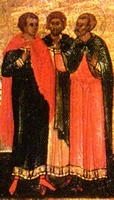
Seven Christians martyred in the persecutions of Diocletian, and the innkeeper who was executed for giving them a Christian burial - Alexandria, Claudia, Euphrasia, Julitta, Matrona, Phaina, Thecusa and Theodatus.
c.304 in Ancyra, Galatia (in modern Turkey)
https://catholicsaints.info/martyrs-of-ancyra-18-may/
CatholicSaints.Info Portable Edition